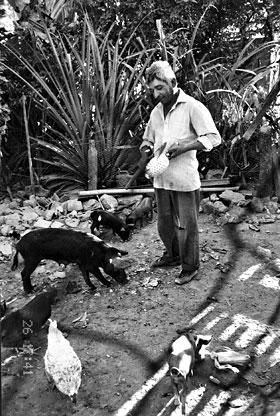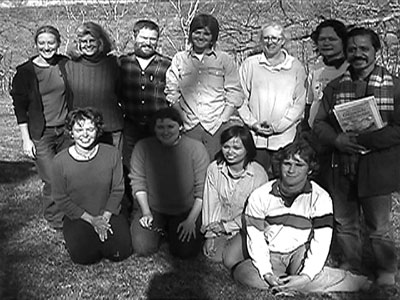 |
| In Carasque, El Salvador, grower Betto Ayala peels a pineapple while his animals enjoy the rind. A delegation of farmers and activists from MOFGA’s “sister” groups in El Salvador will come to Maine in September and participate in the Common Ground Country Fair. Photo by Lucy Funkhouser. |
 |
| The El Salvador delegation |
By Lucy Funkhouser
In January, a delegation of six MOFGA members and two small farmers from the Intervale in Vermont went to El Salvador together. The interesting, productive and fun two weeks that ensued forged many new connections between farmers in El Salvador and New England.
The trip reinforced the reason for the sistering relationship between MOFGA and farmer groups in El Salvador: The challenges facing small farmers in El Salvador have many remarkable similarities with those faced by small farmers in Maine. We both are concerned about genetic engineering, the plummeting price of commodities such as milk, potatoes, sugarcane and coffee, and the tidal wave of globalization that threatens to overwhelm anything that stands in its way.
El Salvador is a country with many problems. The civil war that ripped through the country from 1980 to 1992 left its mark on every family. The economy, long dependent on commodity farming with the vast majority of people scraping by on less than $1,000 a year, is in a major transition. The environment is severely degraded, the health care system is being plundered in a mad rush to privatize everything, and maquila, or sweatshop, zones are proliferating as the infrastructure for the Free Trade Area of the Americas (FTAA) literally bulldozes entire neighborhoods.
Yet our time in El Salvador was not bleak; in fact, it was quite the opposite. We enjoyed the surprising beauty of lakes, mountains and black volcanic beaches, as well as sweet pineapples and tropical flowers. Most powerful were the people who had fought in a war and lost their loved ones but were still interested not only in organic farming, but in continuing to live a life that makes sense – a life rich in community and in the fruits of the earth – in spite of all the odds.
The first community we visited was one of ex-combatants. “We learned to live together in the mountains,” they said of the 80 or so acres that the own collectively. When the war ended, they had nothing. Having grown up fighting, they had no education, nowhere to turn. However, they used the little they had to buy a big chunk of level land, which is now operated by a cooperative and named after a friend who died in the war. They grow conventional sugarcane, keep dairy cattle, raise fish and keep bees. The warmth of these people and their industry in taking charge of their lives in such a positive way was inspiring.
We spent the bulk of our time in the indescribable village of Carasque. Two MOFGA delegations have visited Carasque already, one in 2000, followed by a long-term visit by Karen and Paul Volckhausen in the winter of 2001 to 2002.
The Maine-Carasque relationship goes back to 1991, when, during the last few years of the war, Salvadoran refugees requested international solidarity to help them move back home. Bangor became Carasque’s Sister City.
Since the war ended with the peace accords of 1992, the relationship has evolved into a working partnership that has helped the Carasquenos have street lights, a truck, a school, and scholarships for kids to attend high school in the nearest city. The relationship has deepened into one of equality and real friendship and trust.
Carasque is nestled into the side of a mountain in the northwest part of the country. From the little mud house where we stayed, the mountains of the Honduran border are visible. The old near-monoculture of corn and beans has been replaced with organic perennial crops such as pineapple, coffee, coconut and even ginger. The main cash crop for the farmers we visited was pineapple.
The Salvadoran small farmers with whom we talked are organic but not certified, since the cost of international certification has proven a tenacious obstacle. However, they are dedicated to organic methods and, like organic farmers here, are always thirsty for more knowledge. The MOFGA sistering relationship with two regional Non-Governmental Organizations that support the farmers of Carasque will help support them as they work through certification and other issues.
As the next step in the MOFGA-El Salvador sistering relationship, a delegation of six Salvadoran small farmers and community organizers will visit Maine and Vermont farmers and the Common Ground Fair this fall. The MOFGA-El Salvador sistering committee is raising funds ($1000 per delegate) for this purpose now. We have been fortunate to receive some of the funds through a grant from The Harvest Fund of Maine Initiatives. We welcome donations and help with fundraising. For more information, please contact Paul and Karen Volckhausen at [email protected] or 667-9212.
About the author: Lucy Funkhouser is a grower in Rockland. She fell in love with Carasque when she was part of the delegation last January.
